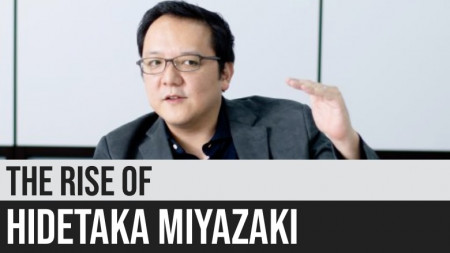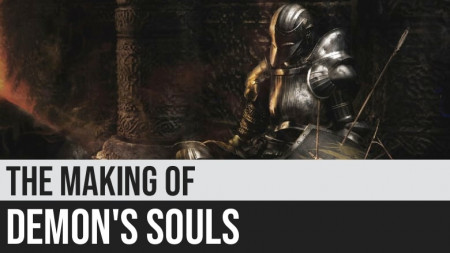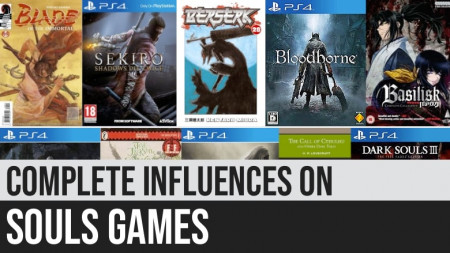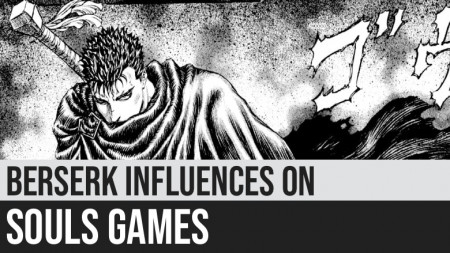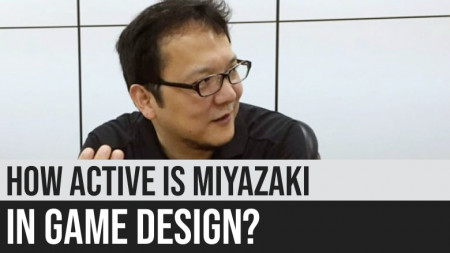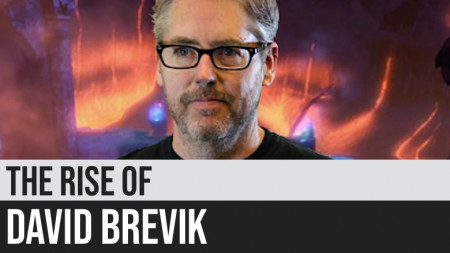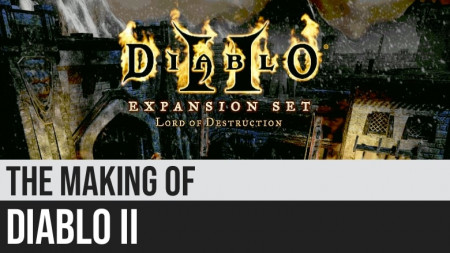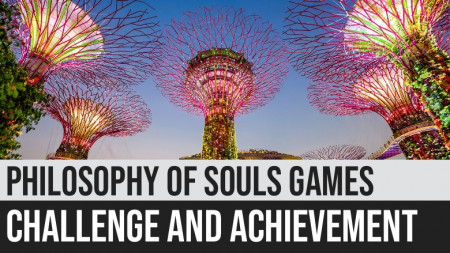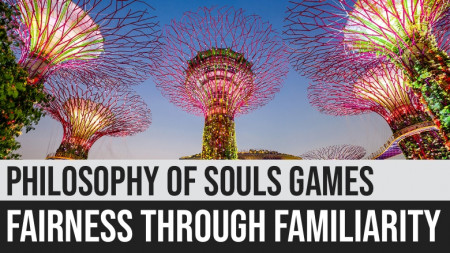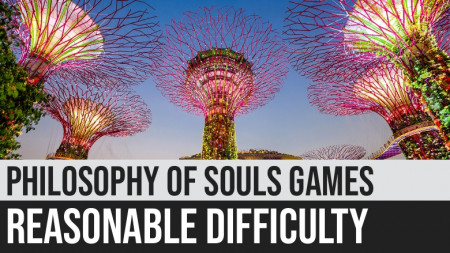
Philosophy of Souls Games: High Integrity
29 Souls games have high integrity
When you play the Souls games, you feel that what you do is worth your time. You may not be winning, in fact, you might be losing one try after another, but you never feel the game being disrespectful to you, your time, and of itself. You never feel that the game is trivializing your experience or itself. That’s because the Souls games have high integrity.
Integrity is defined as follows in the dictionaries:
- The state of being whole and undivided
- The quality of having strong moral principles
- Implies trustworthiness and incorruptibility
We have already covered in the previous chapter how the Souls games have a very strong (1) Unity of Purpose, how every principle used and feature added to the game either creates or reinforces its intent, which is to give the most engaging experience to the players.
This Unity of Purpose represents the first two parts of integrity’s definition. You can never have integrity without having strong principles as well as unity among those principles. But equally important is the state of incorruptibility, which forms the third part of the definition. Having strong principles and unity among them will be worthless if an external factor can trivialize or corrupt them.
Imagine: Let us say you bought a new game with online features. You are enjoying it and you love it. However, one day, the game’s creators introduced a marketplace where players could easily buy the best weapons. Now, what happens to the hundreds of hours you spend playing the game to acquire some of those weapons? And they are selling for 2 dollars? Was your time spent acquiring your best weapons just a few dollars? How do you feel now about your experience? Do you still think it was worth it? Will you still dedicate the same effort and feel passionate about hunting those weapons?
So, it’s not just about having good and united principles; it’s equally important that those principles can’t be corrupted or trivialized by something else, whether through internal or external influence.
Imagine: You spent hundreds of hours hatching the strongest Pokémon you can breed. However, you discovered one day that you can easily buy them online on eBay, with perfect stats and hidden abilities. It will take some effort in your brain to block and ignore this new information you found. You will convince yourself that you are breeding your Pokémon for yourself and that you don’t care about those hacked Pokémon with perfect stats and abilities. However, most people will just give in and buy them on eBay.
Now, we have given two examples where the corruption of integrity comes from outside - either through hacking or through dubious company decisions (like introducing loot boxes to a game to make it pay-to-win), but the truth is, most of the things that erode the integrity of a game don’t come from outside or from malice, but inside the game itself. The truth is, most games do not have integrity, to begin with, and those few that have, have mechanics that kills that integrity.
And this is what we primarily mean when we say that the Souls games have high integrity. It is not that they are not hackable, but they were designed to have extremely strong principles that do not allow corruption or erosion of what they are trying to do.
According to the Manifesto (2):
The primary cost of playing a game is time and whatever the player chooses not to do after deciding to play the game.
Like in any other human activity, this utilized time will never be regained. Hence, it is crucial that the quality of the time spent on the game is always maintained as a homage to the past sessions and as a herald to more plays in the future.
The keyword here is quality: the quality of the time spent in the past, in the present, and in the future playing the game.
The Souls games have an outstanding way of preserving the quality of time: there is integrity in the time itself, between the past, present, and future. There is harmony and unity among them.
How about those two corrupted games we used as examples above?
- The moment the best weapons are sold for real money in a marketplace, the past loses its value, the present becomes pay-to-win, and the future is corrupted. There is no longer unity in time, and the game has lost its integrity.
- The moment a player buys a Pokémon on eBay, the hundreds of hours he spent in the past becomes meaningless, the Pokémon in the present has lost any mythological significance (11 Mythological Design), and future activities are altered and corrupted. It will be just a matter of time before this player will quit Pokémon and remember it with distaste. He brought it to himself and lost the magic of the original game.
So, in the context of games, integrity is not just about having good and united principles but being incorruptible such that players’ time for the past, present, and future are consistent and harmonious.
29.1 Player Contract
We will now go to the specific principles of how the Souls games maintain high integrity, and we begin with the concept of Player Contract.
According to the Manifesto (2.1):
When a player begins a game, he enters a contract with the game’s creators. The player places himself in a state of vulnerability and openness to things that he might not like, and that are not within his control.
He willingly subjects himself to whatever the creators plan to put him through, with the expectation that the journey will always lead to a desirable experience and change in his state of emotions.
The player relies on this implicit contract and puts his trust in the creators that whatever happens in the game, no matter how challenging or frustrating things go, the game will always deliver or exceed the expectation he had set when he decided to play the game through the Pull to Begin, Continue, or Return.
One of the properties of the Souls games is their difficulty, especially in the early parts of the game. It can become truly frustrating, spending hours just to be good at the early part. Try to recall Sekiro and how fast you can die from the tutorial area. And even when you reach the first general, almost everything in the game can kill you. Or try to recall Bloodborne and how difficult it is playing it for the first time.
But you persevere. You stay the course and keep moving forward. Because you believe. Because you trust FromSoftware. Because you know (though you might not be actually aware and just have a feeling about it) that you have a contract with Hidetaka Miyazaki that he will not waste your time struggling here and just trivialize it later with some overpowered mechanics.
You know that Miyazaki respects your time. You know that he respects his game. And you know that he will not trivialize either.
And after you survive the early part of the game, you push on to the middle part and look forward to the later part with anticipation. You know the journey will be consistent throughout; there will be unity in time and integrity in the experience throughout the game.
Miyazaki will make you struggle and give you a hard time, but you know that he will make it worth it in the end. That is your contract.
29.2 Consequence and Accountability
The Souls games have a very real consequence and accountability. You are asking, “Why? What do you mean by very real?”
Before we continue, I want you to remember how Genichiro walled you (3.3 Mandatory Wallers) and stopped you from playing Sekiro (3.5 Challenge Gating), how he almost made you quit, and never to return to the game when you first fought him. How many players actually stopped playing the game because of Genichiro? How many returned their disc and asked for a refund? How many sold their game and hated it? How many went online and cried for an easy mode? How many went to YouTube searching “How can I get past Genichiro?” and went to Reddit looking for validation and searching “Sekiro sucks?”
Sekiro does not care if you can play it or not. That’s how real it is. The game does not care if you stop playing and go away and forget it and never touch it again. It respects itself as well as you. By respecting itself and you, it will not trivialize what everyone has gone through.
According to the Manifesto (2.2):
When a player loses in the game, what else does he lose aside from the actual time he spent playing?
From the mindset of a consumer, time spent on a battle that leads to a win is not lost. It is when he experiences a defeat that the mind projects the time lost.
Losing is a natural consequence when playing a game. But what else do you lose when you experience a defeat?
In a well-designed game, the player is always accountable for a defeat, no matter how unfair the battle is. The player could not blame the game as he is within the Player Contract.
When playing Souls games, you only lose time and whatever you sacrificed for that time. That loss is real. The consequence is real, and you are accountable for it. And you know that there is no other way around it. You cannot bribe the Souls games; you cannot pay to win. You cannot alter what the designer meant you to experience; that is what you paid for and why you entered the Player Contract.
This does not mean that the Souls games have no flexibility, though. In fact, everything you need to win is within the game. You just have to know them (6.3 Triumph through Understanding).
But from the start of the game up to the end credits, the game has a consistent consequence and accountability. You won because you really won.
29.3 Player in Full Control
Players of Souls games are in full control of their games. The games do not explicitly alter or control their behavior.
According to the Manifesto (2.4):
Inside the game, the player is subject to the Player Contract with the creator. But that ends when he quits the game.
Outside the game, the player is in full control.
This means that there should be no mechanic in the game that affects the player when he is outside it. It means the game is exactly in the same state as when he quits it.
The Souls games do not have any mechanics where their real life mingles with their gameplay. Think about some of the most addictive games, like farming games, where the game affects your behavior even though you are not playing it, say through time-based mechanics. You must return to the game; otherwise, your plants will die. You have to return; otherwise, your gems will expire. You have to return, or else the eggs will not hatch. And so on.
When you open a Souls game, it is exactly how you closed it.
29.4 No Compromises
As Challenge-Driven games, the Souls games do not compromise. They are conscientious of maintaining their High Integrity. We already highlighted this in 29.2 above, where we shared the Sekiro example.
According to the Manifesto (2.5):
In the end, the Challenge should always be worth it, and that should never change in the course of a continuously playable game.
By not compromising, the game effectively resists anything that can corrupt it.
And this is most visible in the concept of (2.5.1) One Difficulty.
All of the Souls games, from Demon Souls up to Elden Ring, have always had only one difficulty setting. FromSoftware is doing this not to protect the game’s difficulty but to protect the integrity of the game and the time you have spent playing in the past, present, and future for yourself and other players.
Miyazaki shared below the importance of preserving a game’s integrity for not just one player but all players.
Miyazaki: We don’t want to include a difficulty selection because we want to bring everyone to the same level of discussion and the same level of enjoyment. So we want everyone to face that challenge and overcome it in some way that suits them as players.
We want everyone to feel that sense of accomplishment. We want everyone to feel elated and to join that discussion on the same level. We feel if there are different difficulties, that’s going to segment and fragment the user base. People will have different experiences based on different difficulty levels. This is something we take to heart when we design games.
29.5 Healthy Engagement Loop
All of the Souls games have a healthy engagement loop: they do not induce behaviors that are not within the control of the players.
According to the Manifesto (2.6):
In the Player Contract, we shared that a player enters a contract with the game’s creators when he begins playing. Whether he is aware of it or not, it does not change the fact that from there onwards, he will play according to the whims and rules of the creators.
Example: If the creator, through the game’s mechanics, says that you have to ride a bicycle 20 times around a plaza to hatch an egg, then you have no choice but to do that. Either you use that mechanic, or you quit the game, ending the Player Contract.
Some games, whether by intent or not, can influence and lead the players to unhealthy behaviors within and outside the game.
The Souls games maintain this healthy engagement loop through:
1) Minimal Farming - there is very little farming present in the Souls games. And as you become skilled and go beyond the early parts of gameplay, you can completely ignore farming.
It is with other games that farming is wreaking havoc (2.6.1 No Farming)
Most creators use Farming mechanics to extend a game’s length and pad its content. It is not just a bad practice that leads to unhealthy player behavior but also a bad game design.
Farming manifests itself when the player performs repetitive activities that he does not want to do but feels compelled to do, so he can actually “play the game” or “continue the game.” While doing these “farming” activities, he does not feel engaged; in fact, he will typically perform another activity outside gaming, like watching a Film or a TV Show, just to make the playtime bearable and so he could “move on in the game.”
There is nothing worse for the High Integrity of a game than having these mechanics.
2) Minimal RNG in Rewards - there is RNG in the drops of the Souls games, but the most important ones are always deterministic (think about the boss souls and weapons). In addition, most of the best items in the Souls games are found in the world and do not come as drops from enemies.
Again, it is with other games where RNG mechanics wreak havoc (2.6.1.1 No RNG in Rewards)
The main reason Farming mechanics are possible in most games is due to another widespread mechanic: RNG in rewards.
By making the reward of activity random, the creators can compel the player to perform repetitive, tedious activities, hence making the game longer. Whether it is their intent or not, this RNG mechanic can introduce unhealthy behavior in the players.
When the reward of the activity is random, it acts like a slot machine. There is no engagement in the activity as players do not like it. They just want to get the reward.
The next sections will share how the Souls games maintain High Integrity within the game itself.
29.6 Spatial Fidelity
Have you noticed that all Souls games (excluding Elden Ring) have no maps? Have you also noticed that although they have no maps, they are all open world (by open world, we mean providing a true (13) Unencumbered Experience)? And that they also do not have markers and quest trackers?
Spatial fidelity is the manifestation of integrity in space (think about locations in the game and how you view this world).
It would be best to share here what Miyazaki said about maps.
Question: The Souls games give players very little in the way of instruction or direction. You don’t even implement a map in-game. Why?
Miyazaki: Our goal was to allow players to do what they want, define their own goals, make their own discoveries, embrace their own values, and find their own interpretations. Core to that was the importance of getting lost. This gives value and meaning to finding one’s way.
If you are struggling with an area, it will soon become a familiar place. If you dive into the dungeon over and over again, you will remember that this is the way. I think that feeling is a sense of accomplishment.
We have created a map structure that is easy to comprehend, taking into account the order in which players move their viewpoints and general behavior patterns. In a player’s head, he is aware of how the map in memory is drawn, and he is careful not to exceed the processing capacity.
Now let me ask you a few questions:
Can you replay in your mind traversing the land of:
- Dark Souls?
- Bloodborne?
- Sekiro?
The answer to that is yes, and you did it without a map. It was not the map that filled your mind with pictures of the world of the Souls games. It is your interaction with the world itself. And since you don’t have a map, you have no choice but to remember it. The same applies to the creator of the game. Since he knows you don’t have a map, he would have to design the world such that it is easy to remember. It is a win-win that you would rarely find in other games where a map is always provided (it would not really matter that the world is memorable or generic since you can always open a map).
29.7 Aural Fidelity
Excluding Elden Ring, have you noticed that all of the Souls games only have Natural Sound when you traverse the world? You will not hear a theme song playing while exploring a cave, but you might hear a choir when inside a church.
29.8 Visual Fidelity
All of the Souls games have a consistent Elegance in Design. There is unity, as you can see and feel this elegance whether you are in the most beautiful or disgusting place in the games.
Miyazaki: You may not believe me, but I always tried to maintain a certain level of refinement and elegance in all designs. I often told the artists that being muddy or messy is definitely not good. I think this carries through the entire game. If you asked me to describe what this “elegance” is… well, I think you just have to look at the designs and judge for yourself, but it really is one of the most important factors in everything I oversee.
29.9 Gameplay Fidelity
The Souls games are known for not having a pause button. Imagine what a pause button would introduce to a Souls game. To make things more obvious, let’s consider another game, the Legend of Zelda: Breath of the Wild.
Imagine: Let’s say you are playing BOTW. You are fighting a Lynel, and you have only one heart left. The Lynel is about to do its finishing blow, but suddenly your phone rang.
What would you do?
Most probably, a player will:
- Pause the game.
- Answer the phone.
- Return to the game, and while on the menu, eat something to recover Link’s health.
- Unpause the game.
- Continue the fight as though everything that has caused damage to Link didn’t happen (the integrity of past time being sacrificed to make the present time feel better: time trivialization).
In a Souls game, your character should already be dead (assuming you answered your phone).
Do you recall the topic above about:
By introducing a pause mechanic, the game automatically wiped out three of its major principles. That is what we mean when we say (1) Unit of Purpose is important.
29.10 Combat Fidelity
Excluding Sekiro, have you ever wondered why the games have a stamina management mechanic? What would happen if we removed the stamina? The character will just keep on hacking, and since the hero has unlimited stamina (5 Equaling Principle), the villain must also have unlimited stamina (7.6 Mirror the Hero). Now they can just stun-lock each other to infinity, and the (7) Combat as Dance is gone.
But how about Sekiro? They removed the stamina but introduced the Posture Mechanic. In addition, they also made the (7.3.1) Positioning generous. Do you notice that when fighting a boss, they always pause and stop attacking? They have no reason to do that. But they keep on moving backward and repositioning as though you present a real threat to them (even if you don’t). Hence, they were still able to preserve the Combat as Dance, especially with Sekiro, which has the most visceral and beautiful combat among all Souls games.
29.11 Authentic Adventure
All of the Souls games provide authentic adventure. We will cover this in the chapters of Personal Adventure and Adventure of the Unknown.
